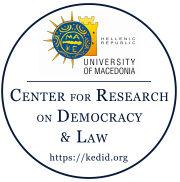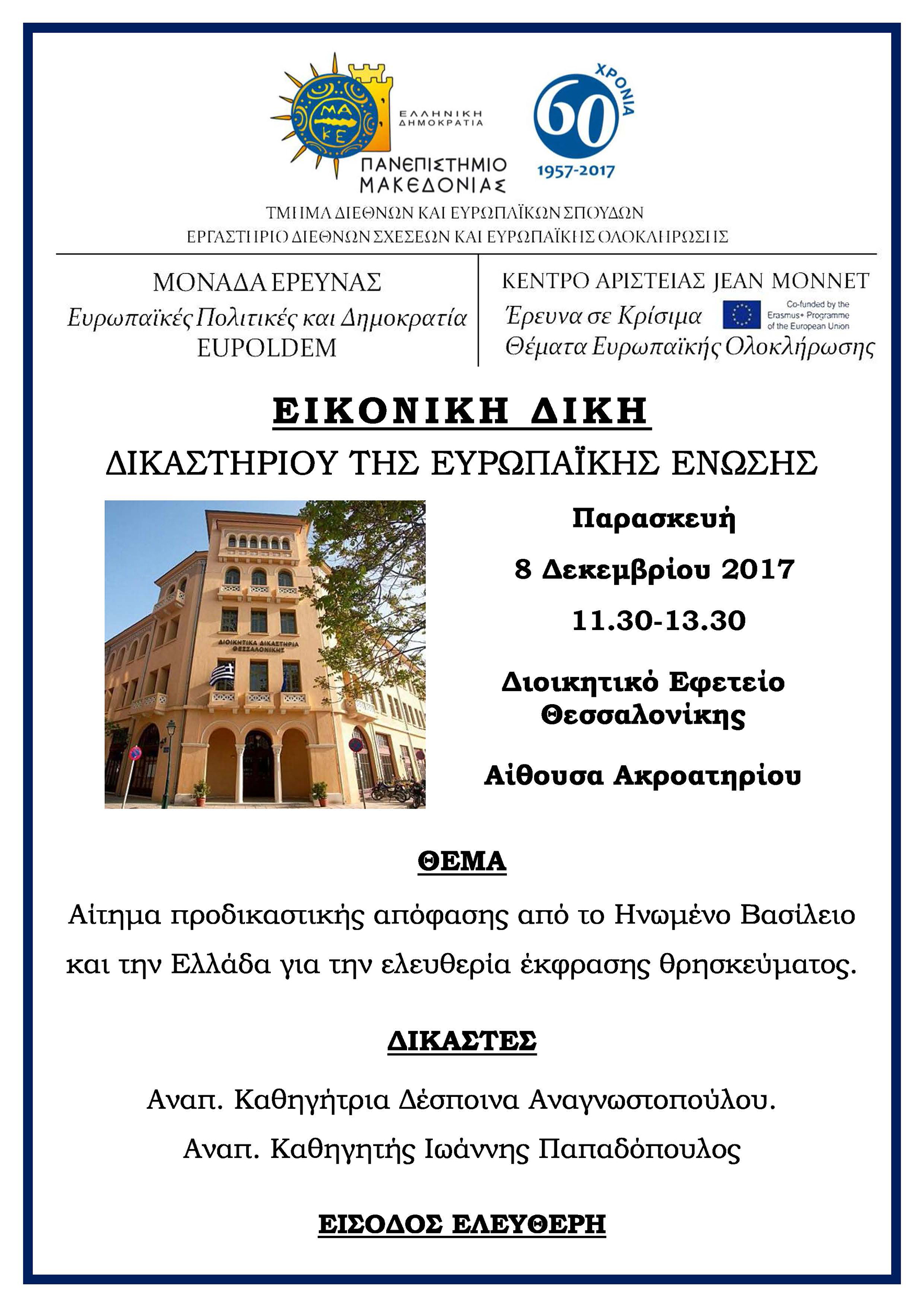The second CJEU moot court organized by Research Unit “European Policies and Democracy” (the predecessor of CEDLAW) with the Jean Monnet Centre of Excellence “Research on Crucial Issues of European Integration” of the University of Macedonia, concerned a joined request for a preliminary ruling by the United Kingdom and Greece on freedom of religious expression in the workplace, and was based on the two recent actual decisions of the Court of Justice of the European Union (CJEU), C-157/15 and C-188/15, in which issues of religious freedom in the workplace were examined by the CJEU for the first time. The moot court took place on Friday, December 8, 2017 (11.30-13.30) in the courtroom of the Administrative Court of Appeals of Thessaloniki.
The organization of the moot court and the preparation of the students, including the drafting of the two different scenarios and their related details of the two cases, was undertaken by PhD Candidate and Administrator of the Research Unit, Alexandros Kyriakidis. Associate Professor and Head of the Research Unit, Ioannis Papadopoulos, and, Associate Professor and Head of the Centre of Excellence, Despoina Anagnostopoulou, acted as Justices.
The first (imaginary) case C-722/14 (Aisha Kalum v Allied Insurance LtD) included a request for a preliminary ruling submitted by the Supreme Court of the United Kingdom, regarding the question of whether the prohibition of the hijab at the workplace of the company constitutes a direct or indirect discrimination, according to the Directive 2000/78/EC, when said company has a rule prohibiting all its employees from bearing any religious, political, philosophical or other related symbols:
– The Advocate General (Dimitra Maria-Karra) was in favor of the argument that the measure taken by the company does not excessively affect the interests of the other side and therefore complies with the principle of proportionality, and that the company under discussion is entitled to apply a dress code and a code of conduct, if it applies horizontally to all employees and is communicated to them from the outset as an essential condition for their recruitment to the company.
– The lawyer of Aisha Kalum (Eleftheria Papadopoulou) argued that her client’s dismissal constitutes a direct discrimination, as the employer acted not on the basis of the company’s general regulation prohibiting political, religious, philosophical and other related symbols, but on the basis of the size and distinctiveness of the hijab, and that the act of dismissal is not consistent with the existence of a legal objective and with the principle of proportionality.
– The representative of Allied Insurance LtD (Sotiria Koutsina) argued that the aforementioned act does not constitute direct discrimination, as the specific rule applies without exception to all, and does not constitute indirect discrimination either, arguing that under the Employment Equality Act of 1998 the company may introduce a regulation intended to defend its interests, while in accordance with the Charter of Fundamental Rights the company reserves the right to restrict rights and freedoms for corporate purposes.
– The United Kingdom representative (Despoina Dontsiou) argued that the company’s decision to dismiss constitutes indirect discrimination
– The representative of the European Commission (Athina Kranta) also argued indirect discrimination, pointing out that the use of a hijab is not an essential and determining professional requirement in this case, as religious manifestation of worship through a symbol does not render the individual inadequate in their duties.
The second (imaginary) case C-767/14 (Karadimitriou Bros v Nazire Abdullah) included a request for a preliminary ruling submitted by the Supreme Court of Greece regarding the question of whether the wish of a client of a company to not be offered reception services by a worker wearing the hijab is an essential and determining professional condition due to the nature of a professional activity or the context in which it is carried out according to the Directive 2000/78/EC.
– The Advocate General (Smaragdi-Christina Papadopoulou) did not consider the will of an employer to take into account the wish of a client to not be provided services by a worker wearing the hijab as a fundamental and determining professional condition.
– The representative of the company Karadimitriou Bros S.A. (Eulampia Stoyannis) argued that discrimination is justified due to the freedom of the company to protect its prestige by preventing actions that affect it and impinge on its customers, thus having a direct impact on its business and economic activity.
– Nazire Abbullah’s representative (Christianna Brouvaki) argued that there was not an integrated rule in the company’s regulation prohibiting the use of religious symbols, and, therefore, there was discrimination on the basis of religious beliefs.
– The representative of the European Commission (Kyriaki Sachpelidou) argued that in this case the use of the hijab could be very well considered a trait associated with the manifestation of religious beliefs and, therefore, dismissal is an act that indicates direct discrimination.
This second moot court strengthened the relationship of the Research Unit with the Centre of Excellence, as well as with the Administrative Court of Appeals of Thessaloniki. This moot court also contributed significantly to the knowledge and experience of the participating students, offering them a unique opportunity to simulate the functioning of the CJEU in a real courtroom (Court of Appeals of the Administrative Court of Appeal). The honorary presence of the Honorable President of the Administrative Court of Appeal of Thessaloniki, Mr. Ilias Kontozamanis, who attended the moot court, was of great importance.

